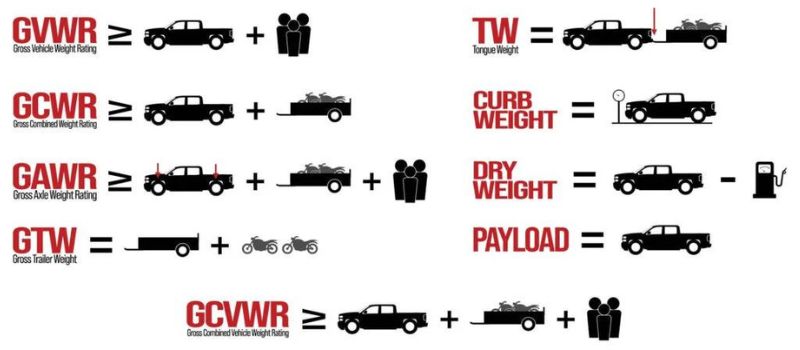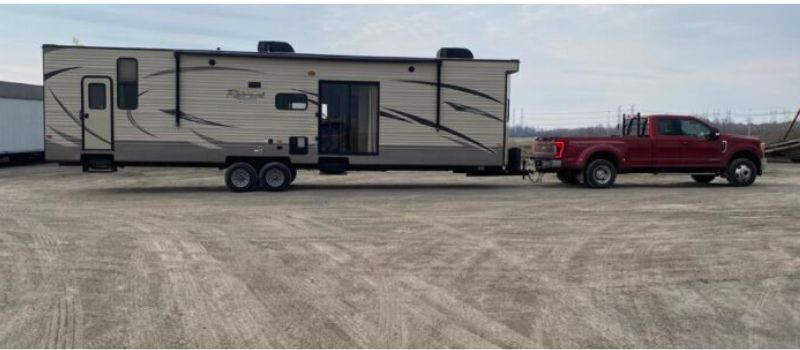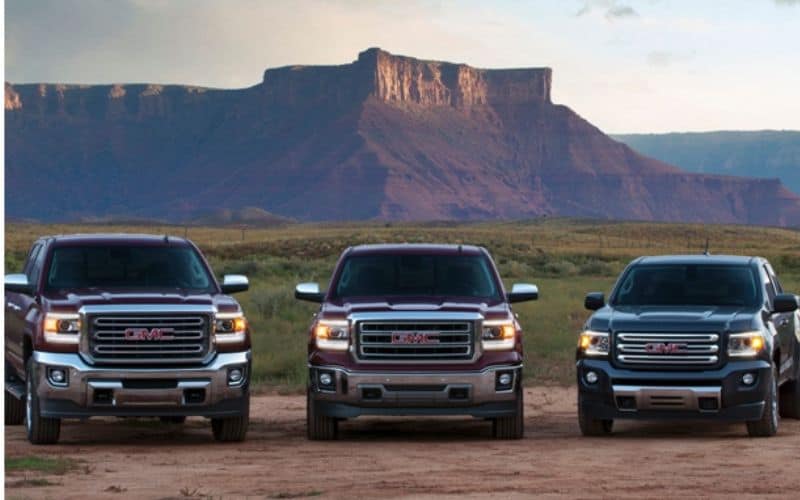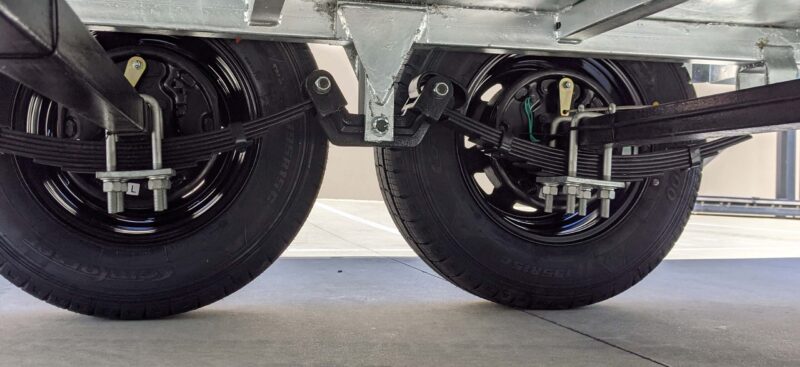Whether you are considering a transition from a motorhome to a travel trailer, or you are a first-time travel trailer owner, truck towing capacity is an important set of values that you need to consider.
If you own a truck and want to purchase a trailer, you will need to know what works for your current truck. If you are considering an upgraded travel trailer, you will also need to know if your current truck can handle the load.
Truck towing capacities can be a confusing set of values, and a lot of acronyms. In this article, we will help you better understand what all of those letters mean. We will also help you understand the specifics of truck towing capacity and how to determine what your truck can tow.
We get tons of questions like this on our YouTube channel comments and in our private Facebook group called RV Camping for Newbies so we feel we can offer some clarity on this issue.
How Do You Know How Much Weight A Truck Can Tow?
Before you run out and buy a new travel trailer, you need to know what your truck can safely tow. This means considering the towing capacity of the truck compared to the trailer that you are thinking about.
Truck towing capacities are not just some magical, made-up number. These values are determined by the truck manufacturer. When calculating the towing capacity of a particular truck, the maker will consider several factors. These factors will allow a truck to safely tow a trailer of a particular weight.
Truck manufacturers must consider all of the following features of the truck.
- The truck’s weight,
- Frame and suspension
- The capacity of each axle
- The drivetrain components
- Engine and transmission
This means that a certain truck model may have a variety of towing capacities. Depending on the trim level or any upgrades that you may add to the truck, the towing capacities may change.
For example, the Toyota Tacoma has over ten pages of tow capacities based on the model, engine, and options in each of their vehicles.
Truck Towing Capacities Explained

When you are looking at the towing capacity for your current truck or perhaps the truck you are looking to buy, there are a lot of different related values.
This list of acronyms can be confusing and it can be hard to decide what numbers are the most important. The reality is that all the numbers are important and you shouldn’t exceed any of them.
Here is a breakdown of the values that determine towing capacity.
Gross Vehicle Weight Rating (GVWR)
Gross Vehicle Weight Rating is the weight of the tow vehicle plus all of the cargo and passengers. This value does not include the weight of a trailer. It is only the maximum weight of the vehicle when fully loaded.
GVWR can also apply to a trailer. In the case of your travel trailer, this value is the weight of the trailer itself, plus all the gear that you may add to the trailer.
Gross Combined Vehicle Weight (GCVW)
Gross Combined Vehicle Weight is the maximum amount of weight that a tow vehicle can handle, including the weight of a trailer. The GCVW not only considers the weight of the trailer and vehicle but also considers all the passengers and cargo.
Gross Axle Weight Rating (GAWR)
Gross Axle Weight Rating is the amount of weight that the truck manufacturer calculates that each axle can handle. Overloading an axle can be very dangerous and should be carefully considered when you are towing a travel trailer. You will see a rear axle value and a front axle value. The GAWR is the combination of these two values.
Payload Rating
The payload calculation for your tow vehicle is the maximum amount of cargo plus passenger weight. When you consider pulling a travel trailer, you need to add this value into your calculations. Many people forget to consider the weight of passengers when adding things up.
Max Tongue Weight
Maximum tongue weight is the amount of downward weight (or force) that can safely applied to the tow vehicle connection point.
Overloading the back of your truck with tongue weight can cause harm to your truck’s frame and suspension. This can also cause unsafe driving conditions for you and your passengers.
Tongue weight can be altered by loading your gear into the trailer in different locations. Weight towards the front of the trailer adds to tongue weight while weight in the rear can reduce tongue weight. Keep in mind, that not enough tongue weight isn’t safe either. In general, you want to have 10 – 15 percent of the GVWR of the trailer as tongue weight.
When Do You Need A Dually Truck?

Dually trucks are a popular option for many travel trailer and fifth wheel owners. These trucks have dual wheels on the rear axle, hence the name “dually”. There are distinct benefits to owning a dually, but they are not necessary for all travel trailers.
The most common reason you may want to consider a dually is if you are looking to purchase a larger, heavier RV. Most single-wheel half-ton trucks have a 10,000-pound towing capacity.
Three-quarter and one-ton trucks with single-wheel axles offer a bit more towing capacity, but it is not a significant increase. When you add the second wheel to a truck’s rear axle you gain around 3000 pounds of increased payload weight.
What this means for the travel trailer owner is that a dually truck can give you a towing capacity of almost 40,000 pounds. Compared to the 10,000 pounds that you get with the standard half-ton truck this is huge. Is it required for most travel trailers? No, however some long trailers and park models can be too much for a single-wheel truck.
Understanding the towing capacity of your current truck will allow you to assess if you need to upgrade your truck to a dually before investing in the travel trailer of your dreams.
Can A 4X4 Truck Tow More?

This is an interesting myth that many travel trailer owners are confronted with. A four-wheel-drive truck does not give you any increase in towing capacity. Four-wheel drive may decrease the towing capacity compared to the same truck in two-wheel drive.
When you make a vehicle four-wheel drive, you add weight to the truck or SUV. This added weight reduces the amount of available weight for towing. It may not be a significant decrease in towing capacity, but if you are on the edge of your current truck towing capacity, between the trailer and your gear, a four-wheel drive truck may be a disadvantage.
RV owners who will gain the greatest advantage from a four-wheel drive truck are those who do a lot of boondocking or off-road camping. A four-wheel drive vehicle may be necessary for you to access the camping locations you find most enjoyable.
In these cases, you probably also have a smaller-size travel trailer that pairs well with a four-wheel drive truck or SUV.
Should I Buy A Truck Or RV First?
Whether you purchase an RV or truck first really depends on your current situation. If you already own a truck or an RV, you should start by purchasing the one you do not already own. Having one or the other may also drive the features that you look for in either a truck or RV.
If you currently have an RV and are looking for a new truck, you may want to consider future RVs you may purchase. You may not need a dually now for your travel trailer, but if you decide to upgrade to a larger RV or a fifth wheel, a dually may be a great investment.
If you are looking to purchase a travel trailer to pair with your current truck, you will need to carefully research RV types and make sure that the one you select will work with your truck’s towing capacities.
For those of you who do not have either a truck or an RV, we recommend that you start by researching RVs first. Find an option that has the features that are most important to your travel needs.
When you find that perfect RV, you can then purchase the right truck to coordinate with the weight and connection requirements of your new travel trailer.
What’s The 80 Percent Rule For Truck Towing Capacity?
Many of the truck towing capacities that you will encounter are the maximum value that your truck can handle. Maxing out your truck’s towing capacity is never a great idea.
A good rule of thumb is to stick with the 80 percent rule. What we mean by this is that you should only load your truck to 80 percent of its maximum towing capacity. When you are towing an RV, this little bit of wiggle room gives you a safety factor for your truck and trailer.
Overloading your truck is actually against traffic laws in most states. If you exceed the towing capacity of your truck and are pulled over, you are likely to find yourself with a ticket and a hefty fine.
These traffic laws combined with towing capacities are designed to keep you and others on the road safe. If you keep your load to 80 percent of the maximum, you never have to worry about operating your truck and RV in an unsafe condition, at least when it comes to towing capacity.
The other reason to not load your truck to the max? It is easier on your truck’s engine, transmission, and frame. Your truck will last longer and will perform better if it is not overloaded or loaded to the maximum towing capacity. Giving a bit of space reduces wear and tear on your truck and can also improve gas mileage.
Final Thoughts About Truck Towing Capacity
Truck towing capacities are one of the most important bits of information that you should know as an RV owner. Following towing capacities and practicing safe towing techniques helps keep the roadways safe for everyone.
Travel trailers come in a wide variety of sizes and weights. Knowing the weight of your RV and purchasing a truck that works with this weight is important both from a safety and performance perspective.
Knowing how your truck towing capacities and RV work together is the first step to a great travel adventure that is both fun and safe.
Related Reading:
– Are Camper Trailer Brakes Required By law?
– 5 Tips For RV Towing On Steep Grades
– Is A Dually Truck Better For Towing An RV?
– Why You Must Understand Tounge Weight When Towing
About the Author:
Jason Gass is a full-time freelance writer and part-time RVer whose goal is to share great stories around a campfire with good friends.
When he’s not working, he spends most of his time camping, searching for the best breweries, and road-tripping in his teardrop trailer with his wife, daughter, and two dogs.




